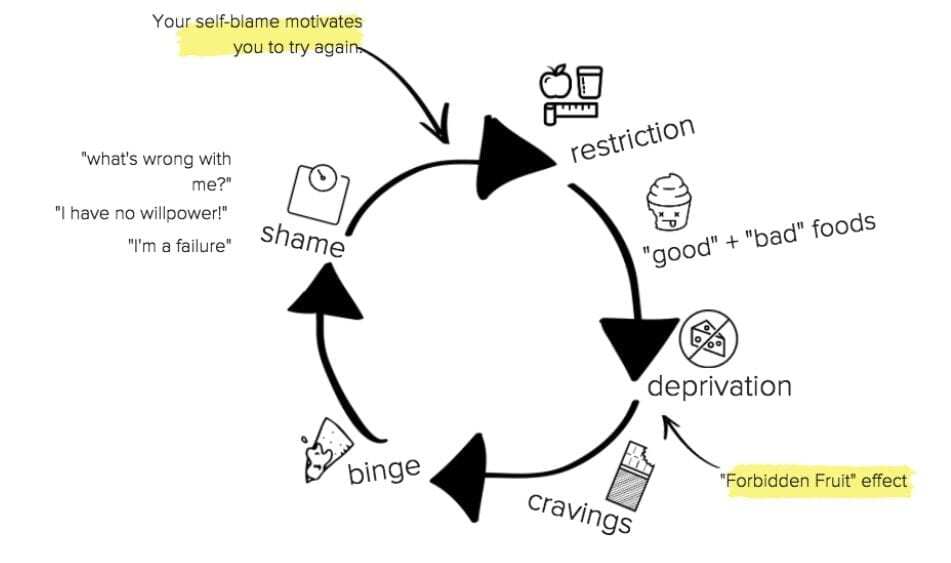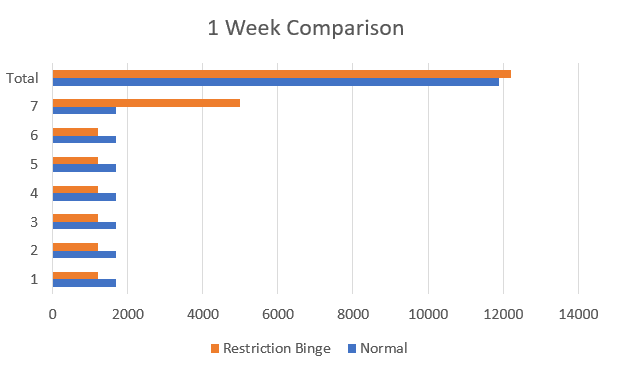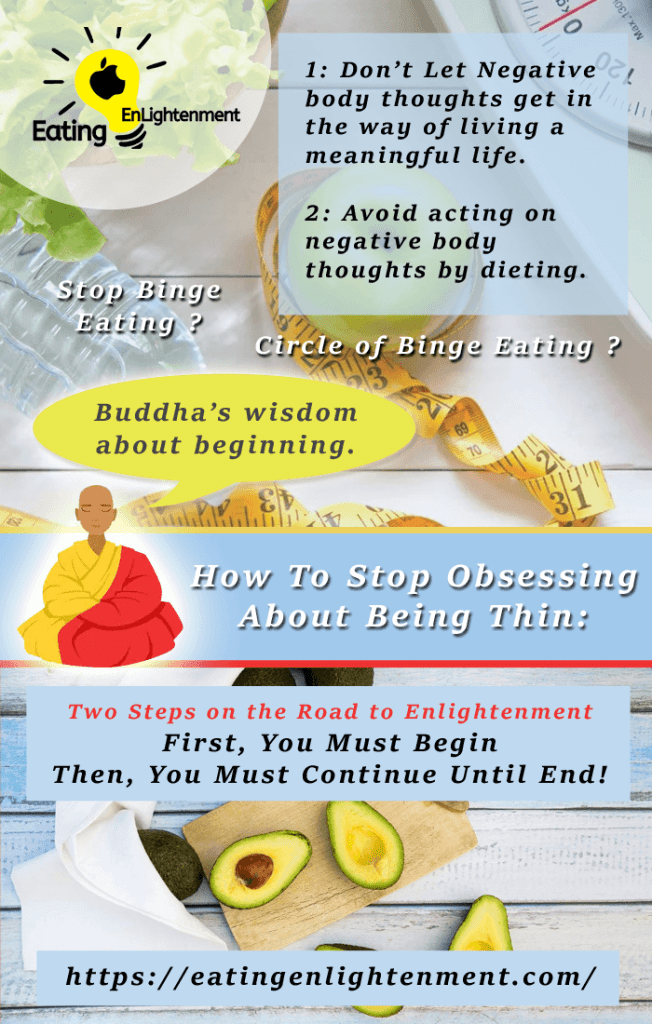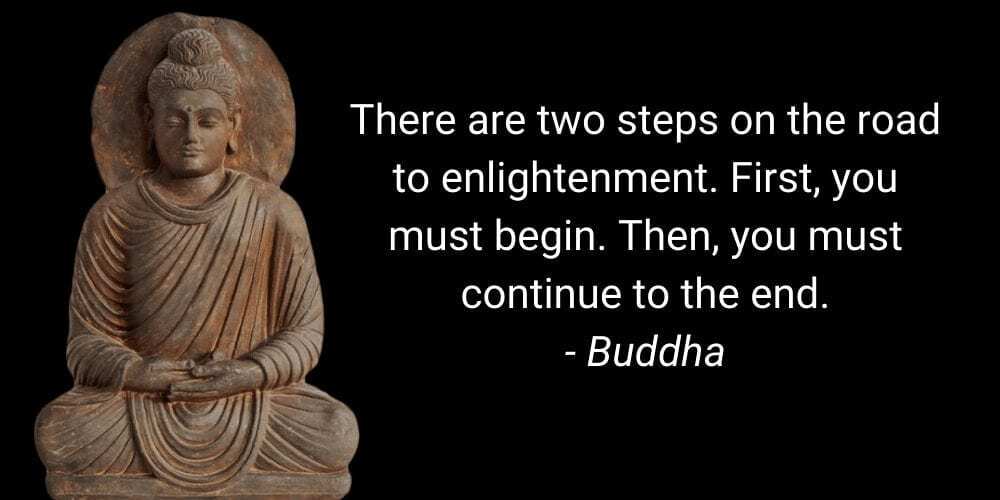I recently asked people on my email list about their biggest problems around food.
One person wrote to me and said that they were tired of “ceaseless, daily thoughts about being thin” and others wrote similar things.
Today, let’s begin walking the path to learning how to stop obsessing about being thin.
To begin this path, we turn to the Buddha.
The Buddha said about the spiritual path that you must do two things to become enlightened.
- First, you must begin.
- Then, you must continue until the end.
This post here will focus on the first step of “beginning“.
This is what Buddha considered to be the first step towards enlightenment.
You just begin.
To begin this journey, you take your first step with your your left and right step.
If you need help getting started on healing your food relationship you may want to attend an Overeaters Anonymous meeting.
The beginning of learning how to stop obsessing about being thin is two-fold.
- First, don’t let negative body thoughts get in the way of living a meaningful life according to your values.
- Second, avoid acting on negative body thoughts with dieting
These two steps are all you need to get started on stopping obsessive being skinny thoughts.
Please note: We are just beginning. The Buddha said there are two steps. This post is about the first step.
- We are not ending body obsessive thoughts.
- Ending body image thoughts is not a realistic goal right now.
- We are not concerned loving your body right now. In fact, it’s totally ok if you never love your body.
I repeat, we are just taking the first step right now. As you get success with these first steps, then you can explore more about what it means to respect your body.
From respecting your body, you can then learn to love your body, even if you have anorexia or bulimia.
But one step at time. We are at square one right now and are just learning how to prevent body obsessive thoughts.
First, let’s talk about not letting obsessive body thoughts ruin your life.
I find this point easier to teach and for people to grasp than avoiding the diet mentality (the second point which we’ll cover below).
I will circle back to avoiding diet mentality after this brief discussion on preventing worrisome body thoughts from holding you back.
Step 1) Don’t let negative body thoughts get in the way of living a meaningful life.
Below are two videos I’d like you to watch. The first video is a TED talk with Taryn Brumfitt. The second video is from my interview with Karen Koenig.
Here are some reflection questions.
Taryn Brumfitt says that women getting kidnapped in Africa, mothers having to hold their children as their child dies and their arms, these are real tragedies – not having a few extra skin folds.
Do you agree or disagree?
What are your thoughts?
Leave a comment or email me if you’d like to converse.
Karen describes how some people are able to go to the beach even though they are overweight but, other people are less overweight and still feel trapped.
Without any judgment, where are you on this spectrum?
Is there anything you can let go of like an external opinion or a limiting belief?
What does the word courage mean to you?
This first step is important. You don’t wait to have a perfect body or perfect internal body image to live your life.
You live your life first. This is the message of the health at every size paradigm.
Don’t wait because otherwise you might waste so many years of your life hating your body.
We clear? In many ways learning how to stop obsessing about being thin comes down to this. Let me a comment if you have any remaining questions. Let’s move onto the second step.
Step 2) Avoid acting on negative body thoughts by dieting
The second point is to not let ‘be skinny’ thoughts lead you to diet again.
I will now talk about two situations here.
- Situation One: the desire to diet after binge eating
- Situation Two: the desire to diet because of obsessive body thoughts
Please note that both these situations – desires to diet after binge eating and because of body thoughts – they both relate to the second point of resisting dieting behaviors.
(the first point was not letting dieting thoughts to be skinny prevent you from living your life)
Much of the information covered in not dieting after binge eating (Situation One) can also be applied to the situation with body thoughts (Situation Two).
However, the second point about desiring to diet based on obsessive body thoughts is more nuanced. In this post I will start to talk about this topic about resisting the desire to diet based on body thoughts.
Situation One: Not dieting after binge eating
After you binge you might want to not eat breakfast the next day as compensation. You might believe that dieting is harmful, but you innocently restrict after a binge.
You just ate maybe 5,000 to 10,000 calories or more. It’s quite natural to want to balance things out:
- Some people vomit.
- Most commonly people skip a meal the next day.
- Some people exercise a lot
Please note that all the above behaviors are dieting behaviors.
To help combat dieting thoughts after a binge let’s review the following points. These are essential points as well if you want to learn how to stop obsessing about being thin.
- One, dieting doesn’t work and leads to weight gain.
- Two, dieting starts a cycle of binge eating.
- Three, when you binge eat you end up eating more then if you had just eaten regularly.
One: Dieting Doesn’t Work and Leads To Weight Gain

Two, dieting starts a cycle of binge eating.

Three, when you binge eat you end up eating more then if you had just eaten regularly.
For average sized woman eating adequately:
(1700 calories per day average) X (7 days per week) = 1700 x 7
= 11,900 calories per week
Or
47,600 calories per 4 weeks
For average sized woman restricting and binge eating (with very conservative binge calories set at 5000):
(1200 calories 6 days a week) + (1 day binge 5,000 calories) =
(1200 x 6 = 7200) + (5000) = 12,200 per week
Or
48,800 per 4 weeks

Now this table is only after 1 week and with conservative numbers. Imagine how this would impact your health over 52 weeks …
The math and science is clear. Dieting goes hand in hand with binge eating and weight gain.
By this point you probably understand that restricting is not good after dieting.
So what’s the solution? Stop binge eating!
Now ending binge eating is a complex process, and this post is not meant to dive into the treatment for binge eating.
Remember, we are just beginning this process of learning how to stop obsessive being thin.
I would like you to note that if you want to stop obsessive body thoughts, you will need to stop binge eating first.
Now I don’t want to just say binge eating is complex and leave you hanging dry. I want to leave you with some practical action you can take after you binge eat.
The practical action I will recommend is simple (although it might sound crazy).
After you binge, you still need to eat the next day in the morning, even if you’ve binged the night before.
Some people think this sounds crazy. But in order for this to make sense, we have to realize that restriction in any form doesn’t work to stop binge eating!
Restriction only starts the cycle of suffering all over again.
At Cielo House where I work with Eating Disorder patients, they have to eat supervised meals.
Let me assure you, there is a treatment for binge eating disorder. The medical community recognizes this treatment and insurance pays for it.
Part of this treatment is eating adequately, reguarly and not restricting!
Now I’ll admit, It takes almost a leap of faith to give up dieting behaviors after a binge. But now you see the bigger picture. You see how binge eating starts with restriction.
To stop binge eating and having this crazy need to compensate (by not eating) you need to stop restricting in the first place.
This is also the first step of how to stop obsessing about being thin!
Ok, so I have talked enough about situation one here enough.
Situation Two: the desire to diet because of obsessive body thoughts
People say, “Okay I get it, I need to eat regularly and stop restricting so that I stop binge eating. This is great. But what if I stop binge eating and don’t lose weight? I need to lose weight!”
Unfortunately, I have met people who had a period of remission from binge eating.
Yet then their weight loss journey wasn’t happening quick enough. Intrusive dieting thoughts crept back into their mentality:
- It’s ok to not eat, you aren’t really hungry right now
- You can eat but only low-carb without any sugar
- You can eat but only within the intermittent fasting guidelines
These thoughts lead to restriction. What does restriction lead to? Binge eating.
How can we learn how to stop obsessing about being thin?
Remember, this post is just about the first step here.
- The first step is living your best life, not letting appearance hold you back.
- The first step is also ending binge eating.
When you first begin, you actually are NOT concerned about stopping obsessive thoughts.
Ending obsessive thoughts is more for after you make progress and are onto your second, third and fourth steps. Then you begin really dealing with these intrusive thoughts. This article is simply about the beginning of how to stop obsessing about your thoughts.
So while this discussion goes beyond the scope of this article, I hope you can still begin if you have stopped binge eating and are courageously living your life.
The following information is an introduction on two general strategies on how you can begin to shift your current thoughts.
- Question The Validity Of Your ‘Be Skinny’ Thoughts
- Redirect Your Attention Elsewhere
Strategy One: Question Your Skinny Thoughts
We live in a culture that promotes an unrealistic, unobtainable body image.
We as human beings (culture aside) categorize information into black-and-white labels.
This means that you are probably having lopsided thoughts about your body that your culture has influenced.
For example, many beauty products promote the idea of physical attraction – if you buy their product.
How many times have you seen a commercial where the insinuation is that you must buy this product to become beautiful?
Seriously. How many times have you seen beauty and self-esteem linked to the purchasing of a product? You’ve seen 10,000-100,000 commercials like this.
This message has been repeated ad nauseum.
You can’t help it. This idea is in your subconscious.
Now you must examine this idea. You must bring it to light. You must reflect upon it.
Here are some questions to get you started:
What habituation thoughts do you have about weight and body shape (by identifying these thoughts you can start to detach from them)?
What stereotypes do you currently hold about the link between weight and character?
Keep in mind that you have a genetic setpoint for weight. If you are binge eating you may be at a weight higher than your set point.
Yet even if you stop binge eating and you lose weight, your natural body weight is probably not what you see in commercials.
You probably won’t ever look the way you truly want to look. This can be hard to hear. But it’s the truth.
But is there anything morally wrong with not looking the way you truly want to look?
Is constantly obsessing about your weight really the life you want to live?
Does your appearance really hold you back from living the type of life you want to live?
Can you think of people in your life who do not fit stereotypes but live a thriving life still?
After questioning the truthfulness of your thoughts, you hopefully can start to see that weight is not the most important thing in life.
Limiting Belief – Watch Out!
It’s not that health is not important.
Please remember that weight and health sometimes have very little to do with each other.
While it’s true that yes, if you are on the extreme end of a spectrum either being very skinny or obese this is not good for your health, there is a wide range of ‘healthy’.
There are people who are ‘overweight’ but have tremendous fitness. Their bodies don’t slow them down. They are strong. Many are active. They dance.
On the other hand there are more slender people who are weak, frail and have low energy. Appearance and weight isn’t the whole story.
While you may never reach your ideal body image, you can still be healthy and feel good in your body.
What associations do you have with weight and fitness and health?
Is it possible that you can be fit and not skinny?
Ok, hopefully we have got you thinking about your weight. Perhaps it’s not as black-and-white as your thoughts may initially paint the picture.
Please note: the goal here is not to stop thinking these thoughts. The goal is to detach from these thoughts. We are just learning how to stop obsessing about being thin – not turn off our thoughts.
These thoughts are part of the culture here in the west. They are going to come up. But how you relate to these thoughts is another question.
Can you see these body image thoughts that come up as the culture’s thoughts, but not your personal beliefs?
Strategy Two: Redirect Your Attention Elsewhere
In meditation at the zen monastery I learned two things about meditation and mindful eating.
- One, I can redirect my attention from my thoughts back into my body
- Two, I didn’t need to get upset if I struggled with this process
Thousands of times I have practiced shifting my awareness from my thoughts back into my body.
Even more thousands of times my brain has returned to thinking. Thousands of times I have had to re-shift my attention back into my body.
This is the process.
Your brain’s job is to think. It does a good job of it! Just like how your skin’s is to feel. Your ear’s job is to hear.
And yes, your brain is going to think. But you can redirect your attention to more important things.






